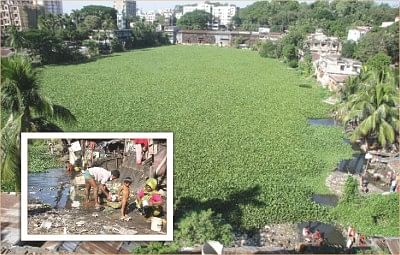A pond without mentor

Askar Dighi: The Slum Dwellers Use Water Of The Dighi For Their Domestic Purposes. Photo: Anurup Kanti Das
It looks like a playground at first sight but it's not. In fact it is a big pond totally covered with water hyacinths. It is a famous pond in the port city called Askar Dighi dug in British period.
One Barada Chakrabarty took lease of the dighi from the British Indian Railway in 1930.
After the death of Barada, his son Sadhan Chakrabarty sold the dighi to Abul Kalam Sawdagar in 1976. Then he sold it to Shawkat Hossain, a shipbreaker, in 1992.
“The dighi is one of the fewest tanks that still could escape from the grip of the greedy developers in the port city. We used to take bath in the dighi couple of years ago. Fishing competition was held regularly in the dighi even ten years ago. It is about to die due to negligence of the owner as well as the city corporation,” said a local seeking anonymity.
“In 1960 when I was a child of six I saw snails under its water,” said Anil Sharma, a local. “We used to drink its water as it was transparent. The taste of its fish was so delicious that I can still taste it,” he added.
The owner has built a slum around the dighi. The slum dwellers use its water for their domestic purposes, including taking bath, cooking and washing utensils. They also drink its water.
Besides, the sewerage lines of safety tanks of the nearby buildings have fallen to the dighi. As a result, all the wastes flow into the dighi, polluting its water.
Following the use of its water, the slum dwellers suffer from various water-borne diseases. It has also now become a safe breeding place for mosquitoes. Thousands of dwellers living in the Askar Dighir Par (bank of dighi) area have to suffer from severe mosquito-bites as well as mosquito-borne diseases.
“I have grown up in this city. I saw the dighi a beautiful one in my boyhood. But now I feel bad when I see it as the dirtiest one,” said Zafar Alam, Director of the Department of Environment (DoE), Chittagong.
Zafar said the DoE can go for action if the owner initiates to fill it up. It is duty of city corporation to clean it regularly, he added.
Advocate Syeda Rizwana Hasan, Chief Executive of Bangladesh Environment Lawyers Association (Bela), said according to Tank Improvement Act-1939 local government can acquire any tank if the owner does not manage it properly.
Dr Alok Paul, professor of the department of Geography and Environmental Study, University of Chittagong, said Askar Dighi is playing an important role in maintaining ecological balance. If it is polluted in this way ecosystem will be affected in the long run, he added.
He said the dighi is also a source of earnings for a lot of people. So Chittagong Development Authority (CDA) and Chittagong City Corporation (CCC) should take proper steps to save the dighi from pollution, he added.
When asked Shahinul Islam Khan, deputy chief town planner of Chittagong Development Authority (CDA), said according to Detail Area Plan (DAP) Askar dighi will have to be rehabilitated and will be brought back to its previous form. It will be developed as a beautiful tourist spot. Everything will be done in cooperation with the CCC, he added. The action will be started very soon, he assured.
When asked, Mayor Manjur Alam said he heard that steps would be taken to clean the dighi and save it from pollution.
Locals said they have formed human chain and staged demonstrations in the port city several times to draw attention of the authority to save the dighi from pollution. They demand that the government take immediate steps to make Askar Dighi and the surrounding area a tourist spot.

 For all latest news, follow The Daily Star's Google News channel.
For all latest news, follow The Daily Star's Google News channel. 



Comments